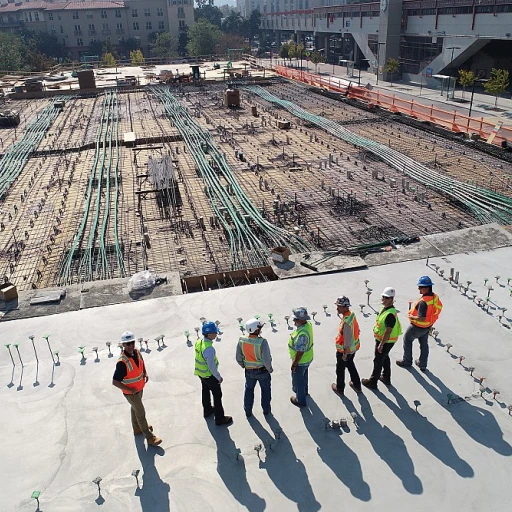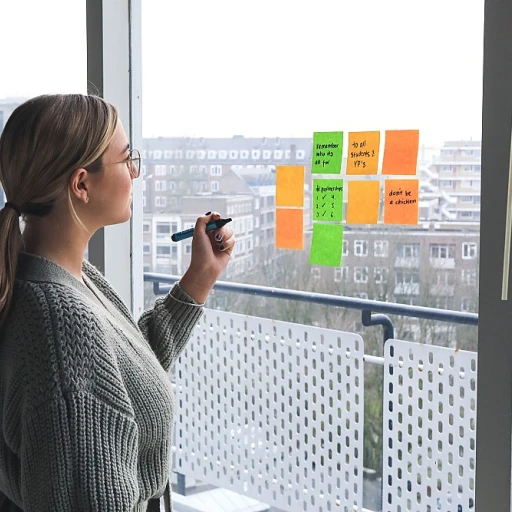Understanding Educational Project Management
Grasping Core Concepts of Project Management in Education
In the ever-evolving landscape of education, successful educational project management is pivotal for the progress and growth of both students and educational institutions. At its core, educational project management involves a systematic approach to planning, executing, and monitoring projects designed to enhance learning outcomes. Utilizing management education techniques, educational institutions aim to improve educational resources, maximize teacher efficiency, and better support student achievement. Educational projects can range from curriculum development, integrating innovative learning tools, to large-scale infrastructural undertakings within educational establishments. The role of project managers is crucial in navigating the myriad tasks associated with such projects while maintaining alignment with set goals. Effective project management ensures that resources are optimally allocated, tasks are executed on time, and educational objectives are met with the desired educational outcomes. To successfully manage educational projects, one must grasp core management principles and learn to employ various management tools. Task management, for instance, enables project managers to assign, track, and monitor tasks throughout a project's lifecycle, ensuring steady progress without overshooting timelines or budgetary limits. The use of management software can greatly streamline these processes, allowing team members to collaborate efficiently and access real-time updates. Equipping oneself with robust management skills not only helps to navigate these challenges effectively but also sets the foundation for innovative strategies in continuous learning. This adaptive approach facilitates the incorporation of cutting-edge solutions and technologies in educational projects, ultimately fostering a more engaging and effective learning environment for students. For those interested in a deeper understanding of the intricacies involved in project management, particularly in the educational sector, exploring the dynamics involved can provide valuable insights. Understanding the dynamics of power in project management can offer practical knowledge on wielding influence and managing cross-functional teams within educational projects.Key Components of Successful Educational Projects
Crucial Ingredients for Effective Project Work
In the realm of educational projects, the path to success is often outlined by certain fundamental components. Having a clear understanding of these key elements not only streamlines the project management process but also enhances the entire educational experience for both the educators and the students.- Comprehensive Planning: Effective project management starts with detailed planning. This involves establishing clear objectives, setting realistic timelines, and allocating appropriate resources. When planning is done efficiently, it lays a solid foundation for future tasks and helps in maintaining the project’s progress.
- Efficient Use of Resources: Management education often emphasizes the strategic allocation of resources. This includes human resources like teachers and team members, as well as physical and financial resources. Utilizing management tools ensures that resources are optimized, minimizing waste and maximizing productivity.
- Skilled Team Members: A successful educational project requires a team of skilled individuals. Whether it involves teachers who are adept at managing educational content or project managers with a knack for task management, having the right skills in the team is crucial. Continuous learning opportunities for team members can significantly contribute to their overall development and the project's success.
- Effective Communication: Clear and open communication is vital in project-based education. It helps in aligning the project goals with the educational institution's objectives and ensures that all team members are on the same page, thereby facilitating smooth progress.
Challenges in Educational Project Management
Addressing Common Hurdles in Educational Level Work
Dealing with obstacles in educational project management is crucial for ensuring successful outcomes. Projects in the education sector often involve intricate processes, and understanding potential challenges is vital for effective management. One common issue is effective resource allocation. Educational institutions often operate with limited resources, making it critical for project managers to allocate resources judiciously and prioritize tasks. This requires advanced management skills and a keen understanding of project management principles. Time management is another frequent challenge. Whether working on course planning or managing complex educational tasks, time management tools and techniques are essential. Project managers must effectively plan to ensure projects progress according to schedule, and this often involves sophisticated task management and the use of management software. Communication within the team and with stakeholders is also a challenge. Ensuring that all team members are on the same page regarding project goals and progress requires clear, consistent communication strategies. This not only helps prevent misunderstandings but also ensures that everyone is aligned with the project's objectives. Additionally, adapting to the evolving educational landscape can be daunting. The rapid advancement of technology and shifts in educational norms require project managers to be flexible and innovative in their approach. They need to leverage cutting-edge management tools and resources to help students and teachers effectively engage with new educational paradigms. Effective overcoming of these challenges often calls for continuous upskilling and learning. For more insights on preparing your mind and body for learning opportunities, you can explore this resource to navigate the evolving challenges in educational projects.Innovative Strategies for Continuous Learning
Embracing Innovation for Lifelong Learning
In today's fast-paced world, continuous learning is pivotal. The education sector is constantly evolving, and so must the strategies we employ in educational project management. Here’s how innovation plays a key role in enhancing learning outcomes:
Customization of Learning Experiences: Technological advancements allow educators to tailor educational experiences to individual student needs. By leveraging data analytics and adaptive learning platforms, project managers can ensure that resources align with diverse learning styles and paces. This not only helps students grasp content more effectively but also increases engagement.
Collaboration and Resource Sharing: Innovative tools make collaboration seamless, allowing team members to work more cohesively. Platforms that support shared resources, such as cloud-based management software and virtual task management systems, streamline the workflow. These platforms help projects progress efficiently, as teachers and students can access and contribute to a shared pool of information.
Flexibility in Project-Based Learning: Implementing innovative strategies within project-based learning frameworks gives students hands-on experience, preparing them for real-world challenges. By using flexible management tools, education project leaders can adapt to changes swiftly, ensuring that projects meet educational goals despite shifting dynamics.
Enhancing Teachers' Management Skills: Educators benefit from continuous professional development resources, enhancing their management skills. Workshops and courses on new technologies or updated management principles equip teachers with tools to lead projects more effectively. This, in turn, enriches the educational institutions’ overall capacity for delivering quality education.
Overall, innovation in educational project management encourages a learning environment that evolves alongside technological advancements, ensuring both educators and students thrive in a modern education landscape.
The Role of Technology in Educational Project Management
Integrating Digital Resources to Strengthen Management Efficiency
In the realm of educational project management, technology stands as a pivotal tool in enhancing the efficiency and effectiveness of managing tasks and resources. Educational institutions, now more than ever, are leveraging management software to streamline processes and facilitate smoother project delivery. Utilizing project management software is essential in organizing tasks, allocating resources, and tracking progress efficiently. This not only benefits project managers but also helps team members stay aligned with their objectives. Management tools are tailored to encourage collaboration among students, teachers, and project leaders, ensuring that educational projects run seamlessly from conception to completion.Technological Tools That Promote Active Learning
Incorporating digital platforms has revolutionized how educational projects are managed today. Tools that support real-time collaboration provide platforms where team members are constantly updated on project advancements, allowing for real-time adjustments and efficient time management. Moreover, by embedding management education into the project, tools enhance management skills for everyone involved. Courses facilitated through online platforms offer resources that help students and educators grasp the intricacies of effective project management.Enabling Adaptive Learning Through Technology
Beyond merely managing tasks, integrating technology into educational projects fosters adaptive learning environments. Adaptive tools cater to the diverse needs of students, providing personalized education experiences based on individual learning styles. This individualized approach helps students engage more actively with their course content while keeping educators informed of the progress. Overall, embracing technology in educational project management allows educators to incorporate innovative strategies, ultimately refining teaching methodologies and improving student outcomes. The education sector continues to evolve, and as concepts of project based learning grow, these technological tools will play a pivotal role in shaping future educational paradigms.Case Studies: Success Stories in Educational Project Management
Real-World Examples of Educational Project Success
In the realm of educational project management, understanding the practical application of theories and strategies is crucial. Let’s delve into some real-world examples that highlight how effective project management can transform educational initiatives.
Case Study 1: Integrating Technology in the Classroom
An educational institution embarked on a project to integrate technology into its classrooms to enhance learning experiences. The project managers employed advanced management tools to streamline tasks and ensure efficient resource allocation. By utilizing management software, they effectively tracked progress and made data-driven decisions. The result was a significant improvement in student engagement and learning outcomes, demonstrating the power of technology in education.
Case Study 2: Collaborative Learning Environments
A project aimed at creating collaborative learning environments in schools showcased the importance of teamwork and planning. Project managers brought together teachers, students, and community members to design spaces that fostered creativity and collaboration. Through careful task management and open communication, the team successfully transformed traditional classrooms into vibrant, interactive spaces that promoted continuous learning and innovation.
Case Study 3: Professional Development for Teachers
Another successful project focused on providing professional development courses for teachers to enhance their management skills and teaching methods. By leveraging management principles and educational resources, the project helped teachers acquire new skills and adapt to changing educational demands. This initiative not only benefited the teachers but also positively impacted student learning, proving the value of investing in teacher development.
Lessons Learned
These case studies illustrate the effectiveness of strategic planning and resource management in educational projects. They highlight the importance of clear objectives, efficient task management, and the integration of technology. Educational institutions can draw valuable insights from these examples to improve their project management practices and achieve successful outcomes.












